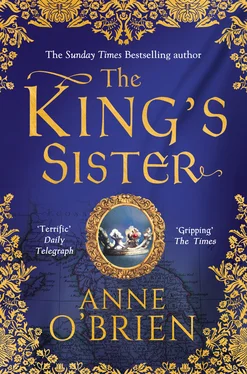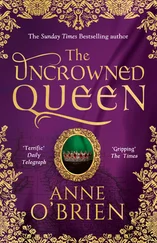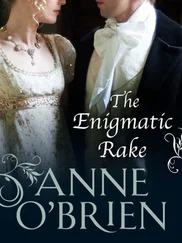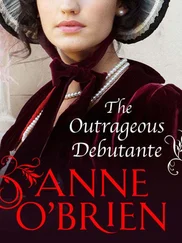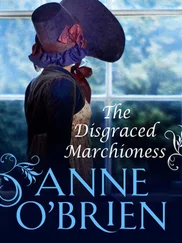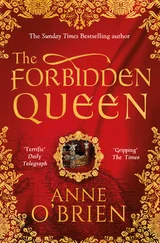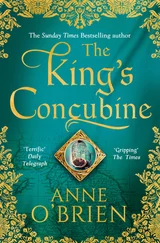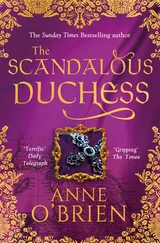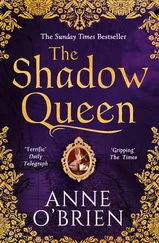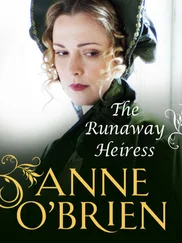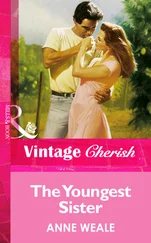1 ...6 7 8 10 11 12 ...21 ‘How I’d kiss her—Oh and more!
Dulcis amor!’
Turning my face away, wishing misty-eyed Hubert would take his songs and his sentiments and shut himself in the stables out of my hearing, I shivered. And not for Jonty’s embrace on a forest floor. My tempestuous virginal dreams did not involve Jonty.
I tried. I really tried in those first days when the festivities continued and the new Earl and Countess of Pembroke were under scrutiny. Taking Dame Katherine’s advice to heart, I tried, like a good wife, to seduce Jonty into liking me more than he liked the parrot. I hunted with him. I rode out with a hawk on my fist, a pastime I enjoyed for its own merit. I played games, trying not to beat him too often at Fox and Geese. But he was just a boy and would rather spend his boisterous time and energy with Henry or the other lads of high blood who came to learn their knightly skills under my father’s aegis.
‘What do you expect?’ Philippa observed as, lingering on the steps leading up to the new range of family apartments, we watched him escape his mother’s clutches and race across the courtyard towards the bellows and clashes of yet another bout of practice warfare.
‘I expect nothing more or less. He is a boy.’ I grimaced a little. ‘It is his mother and grandmother who expect me to dance attendance on him more than I see fit. I can feel their eyes on me. Is it not enough that we sit together at dinner? That we kneel together to hear Mass? If I have to discuss the respective merits of birds of prey one more time, I’ll …’
My words dried as Jonty came to a halt under the archway, spun on his heel and seeing us as the only audience, waved furiously in our direction, both arms above his head.
‘My lady,’ he shouted in a piercing treble.
‘My lord,’ I replied at a lesser volume.
Jonty bowed. I curtsied. He bowed again, and I saw the compact, graceful young man he would one day become. Then:
‘Did you see me, Elizabeth? Did you see?’ His excitement echoed from the stonework.
I descended and walked towards him, reluctant to continue the conversation at shouting pitch, which he was quite likely to do, scowling at Philippa to stop her laughing. What had he been doing today that I had not seen? In the tilt-yard probably. Practising archery or swordplay? I made a guess, based on his sweat-streaked face and scuffed clothing. His hair resembled nothing so much as a rat’s nest.
‘Indeed I did see you.’ Now I was within speaking distance. ‘You rode at the quintain as if you were born in the saddle.’
‘The Master at Arms says I’ll be a knight in about twenty years.’
He did not see the irony of it yet.
‘But that seems a very long time to wait …’
Or perhaps he did.
‘Will you come and watch me, Elizabeth? If I try every day it may not take me twenty years.’
I did and applauded his valiant efforts. Henry, who had come to stand at my side, swiftly vanished in the direction of the mews when Jonty dismounted at last and bore down on us. Even Henry grew weary of Jonty’s exuberance.
‘I’d run for it if I were you. His tongue is like a bell-clapper.’
It was indeed like owning a pet dog, I decided. I could not dislike him. He was lively and cheerful with the ability to chatter endlessly when the mood took him. His manners were impeccable with an inbred courtesy that I could not fault.
But he was no husband.
Being Countess of Pembroke palled when I had no knight to squire me or write verses to my beauty. Jonty was brave and bold but quickly proved to have no interest in poetry and possessed the singing voice of a corncrake. Although he counted his steps less obviously when we danced, it was obvious that he would rather be in the saddle.
So, as it must be, when his family returned to their far-flung castles, I left Jonty to his own devices and returned to the pattern of my old life. A wife but not a wife. Countess of Pembroke, yet no different from Elizabeth of Lancaster, except that my carefree adolescence had been stripped away in that exchange of vows and sprinkling of holy water. I was part of the grand order of alliance and dynastic marriage.
But when I received an invitation to spend time at Richard’s court, I lost no time in ordering my coffers to be packed. While waiting for her husband to become a man, the Countess of Pembroke would shine in her new setting.

January 1382, Westminster
In these days after the Great Rising had been laid to rest, there was a glitter about the King. Richard: no longer the child who wailed when Henry teased him, or when we, as children, refused to allow him the respect he considered his due. He had been a boy easy to tease. Now there was a bright, hard brilliance that I did not recall, almost febrile. The days when he was no more than a terrified youth before he rode off to face to the rebels and quell the revolt at Mile End were long gone, even though it was a mere matter of months. I curtsied low before him and his new wife.
Anne. A foreign princess, come all the way from Bohemia, with an extreme taste in Bohemian headdresses. This was the most extravagant yet, its wired extremities almost wider than her hips, its veiling reminiscent of bed-curtains.
‘My Lady of Pembroke,’ Richard, seated on a throne draped in gold cloth, purred in greeting.
‘Sire.’ I rose from my obeisance, our eyes fortunately on a level since Richard had had the forethought to have the thrones placed on a low dais. He would not have approved of my superior height, for I had my father’s inches. Richard, to his chagrin, was not quite full-grown at fifteen years in spite of his autocratic air.
‘Allow me to make you known to my new wife, Queen Anne.’ He turned to the lady at his side. ‘This is my cousin Elizabeth of Lancaster, Countess of Pembroke.’ His eyes glinted with heady delight in the candlelight. ‘She and her family are dear to me.’
So formal from a boy I had known since his infancy, a boy I recalled clinging to my skirts, demanding that I allow him to fly my new merlin when it was quite clear that she was still in heavy moult, but I followed the desired ceremony as was his wish. Richard was recently seduced by ceremonial and grandeur. All because he had been given the Crown of England at so young an age, Henry frequently observed, interlarded with colourful epithets. Being the King of England when he was barely breeched had given him a damned superior attitude that he had yet to earn. Henry was more interested in tournaments than ceremony and tended to sneer when Richard wasn’t looking—and sometimes even when he was, but it was no longer wise to do so now. Richard was beginning to flex his regal muscles.
So I curtsied again, head bent as was seemly, to Queen Anne.
‘My lady. I am honoured,’ I murmured.
Queen Anne smiled with a knowing acceptance of this piece of foolery. A year older than Richard, she looked to be little more than a child, a tiny scrap of humanity, but with a sharp eye and a tendency to laugh at the ridiculous. She also had a will of iron beneath her formal robes. There was nothing of a child in Queen Anne despite her lack of presence. Which pleased me.
‘We are most pleased to welcome you, Madam Elizabeth,’ she said graciously, indicating with a curl of her fingers that I should rise.
Richard stepped down at last, to salute me formally on each cheek. ‘I know that you will be a good friend to my wife, Cousin.’
‘I will be honoured, Sire.’ I tried successfully not to laugh. How remarkably pompous he sounded for a lad whom I had rescued from the carp pond at Kenilworth where Henry had pushed him.
Читать дальше
